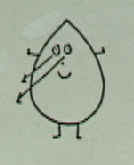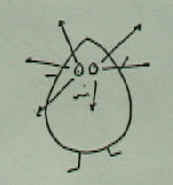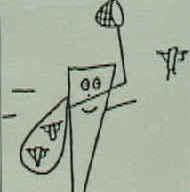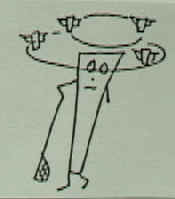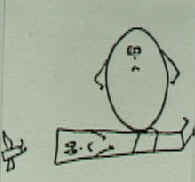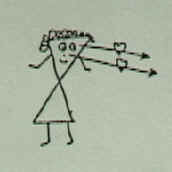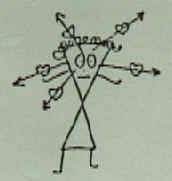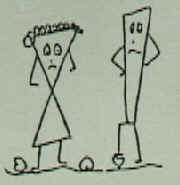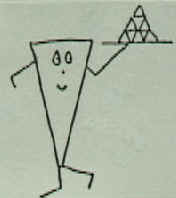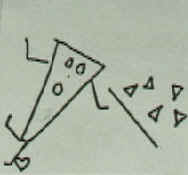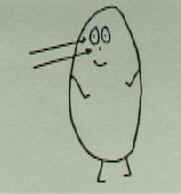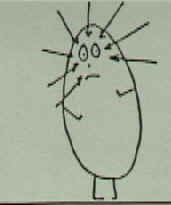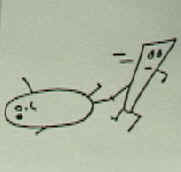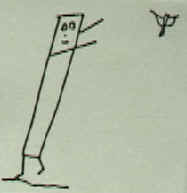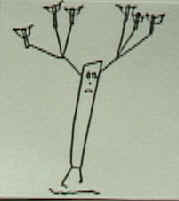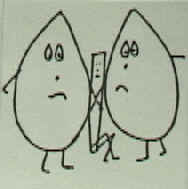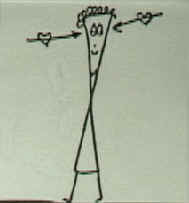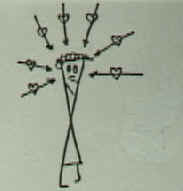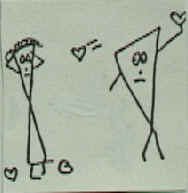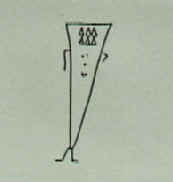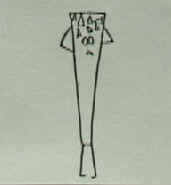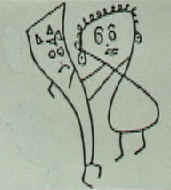NOTE TO THE SECOND PRINTING
We have taken the occasion of this printing to make small corrections in the text and eliminate the appendix.
Chapter 1:C.G. JUNG'S PSYCHOLOGICAL TYPES
The sun filtered through the pines that surround our forest home that I share with my husband, Jim. I walked along the dusty path and saw written on it the secret story of the night. Here a rabbit had hopped by on his rounds, over there a tiny field mouse had scurried by, and the sharp hooves of a deer had marched up the trail to the salt lick. But there is much of this story that I cannot read. One morning a new track appears. What animal made it? Where did it come from? What kind of life does it lead?
Sometimes I wish I had a real tracker with me, someone like Tom Brown who was trained as a child by an Apache, Stalking Wolf. He spent countless hours following tracks, watching them being transformed by wind and weather, and learning the ways of the animals who made them. If Tom Brown were here, I think, I wouldn't be confined to the most obvious signs on my little path. I could learn to see and follow these tracks to their ultimate conclusion.
This winding path makes me think of my own years spent learning to track the most elusive of creatures, the one that hides by standing right in front of us, and conceals himself by leaving a million tracks, the one we assume we already know completely: ourselves. And I learned to track quite by accident, or maybe it was that kind of happy chance that often brings us some of the best things in life.
I had a job, an apartment, a car, a little money in the bank and a circle of friends. I should have been content, but something was missing. People had come into my life - and gone - and I had a faint suspicion that I could have learned something both from the success and failures of those relationships. But just what that lesson was escaped me. My years in school had done little to give me an answer. No one taught me how to get along with people. I took an occasional psychology course, or saw a movie or read a book where the main character faced some sort of psychological dilemma, and a psychiatrist helped him out of it, but nothing I saw or heard spoke to me personally. I wasn't suffering from any mental disorder. I ate well, slept well and seemed to be a success as far as the world was concerned. But it wasn't enough. I needed to find a deeper way of understanding myself and others.
Then I met Jim. Right from the beginning our relationship was different. He had had much the same experiences and had felt the same undefined longing, but one day not long before we met he had come across a book that was to change both our lives. It was C.G. Jung's Psychological Types. At first glance this large volume looks exactly like the kind of book that has made psychology irrelevant to so many people. But it isn't. It's really about Jung's own search to make sense out of his own life. Jim somehow felt in a way that he couldn't really articulate or fully understand that this book could help us make sense out of our own lives, too. It encouraged him to read other books by Jung, and the result was that when we went to the park he tried to explain how men and women project on each other and what Jung meant by the anima and animus. Eating bread and cheese on a river bank was accompanied by a discussion of the unconscious. Dinner was topped off by a description of introversion, extraversion and the four functions. Some dates! I had never heard of Jung, but I recognized the words extraversion and introversion. Extraverts were the life of the party, while the Introverts were busy being wall flowers. Extraverts were dressed in carefully chosen color coordinated outfits, while the introverts were discreetly attired in mouse gray or dull brown. Extraverts carried their hearts on their sleeves, while introverts tended to be morbid. To be extraverted was to be a success, but an introvert wasted endless hours alone in melancholic introspection. Extraverts were making touchdowns while introverts were quietly curled up in a corner reading a book. Extraverts quickly caught on to the game of life, while the introverts didn't even seem to know the rules.
Jim was quick to correct my impressions. For Jung both introversion and extraversion were equally acceptable ways of dealing with life, and didn't have much in common with the popular definitions. It was interesting, but I have to admit it all sounded pretty theoretical.
Then one night I had a dream that changed everything. I told it to Jim the next day. I was in my own second floor apartment looking into an apartment in the next building on the first floor. A girl I knew only slightly was finishing a painting. It consisted of a black arc in the shape of a half circle. I could see blue sky and six men dressed in medieval black suits with large frilly white collars inside the arc. All the men were looking at the arc, each looking at the portion nearest him. I began to pay special attention to the picture, and as I looked closer I noticed the men had clear blue eyes.
I had a special feeling about this dream, and when I was describing it I realized, with a shock, that this painting was not static. Those men were real! Their blue eyes were alive. While I was describing the painting to Jim he suddenly sat upright and listened with a new intensity. And when I was through he asked me to repeat the whole dream again, detail by detail. Jim had read seemingly obscure passages in Jung about the animus, that male dimension of a woman's personality, and how it is often depicted by groups of male figures. Now those figures had stepped off the pages and into my dream. They had become real to both of us. Though it was to be many months before we began to fully understand this dream we sensed its importance. My job was to help finish the painting, to try to complete the circle, and to attempt to get to know the rest of myself. And it was Jung's psychological types that were going to be the chief tool in accomplishing this work.
So come along and let me describe Jung's types, not so that you will end up knowing what I think about them, or even what Jung had to say, but so you can see if they might be one of your happy chances that can help you begin to track the hidden parts of yourself and see into your own life more deeply.
WHAT IS A TYPE?
Even though it doesn't bother us to talk about types of roses or pine trees or human blood, there is something in the very idea of typing people that makes us feel uneasy. Types threaten us from two directions. First, we are afraid that they will pigeonhole us, deny our uniqueness, and replace it with a superficial label. Secondly, we feel they are somehow undemocratic and could lead to prejudice and repression.
Typology is the study of human differences. C.G. Jung's psychological types are not based on set descriptions that real people must be fit into, but on basic elements which, when combined together, can be used to describe the differences among people. A type is a group of characteristics that stands midway between the universal traits common to us all and those which are uniquely our own. For example, we all have eyes. Yet our own eyes are unlike anyone else's. But between these two poles there are groupings of blue-eyed people, brown-eyed people, etc. Types are a bridge between the universal and the particular. Every typology can be abused in order to deny the universal or the unique in man, but a good typology is a powerful aid to a deeper understanding of who we are.
WHO WAS C.G. JUNG?
C.G. Jung, 1875-1961, was a Swiss psychiatrist and psychologist. He was an early collaborator with Freud, a prolific writer whose collected works fill 18 volumes and the founder of a distinctive school of psychological thought that is being continued and developed today by a world-wide network of Jungian analysts and sympathizers.
But more important, Jung was an intrepid explorer of the inner world of the psyche. For him this inner world, which he called the unconscious, was not simply a basement filled with forgotten memories and useless junk, but was like an ocean or forest filled with beauty and danger, life and death, and meaningful discovery. It was out of his confrontation with the unconscious, both in himself and in his patients, that he slowly elaborated his psychology. His book Psychological Types acted as a compass or surveying tool by which he tried to understand how he differed from Freud and Adler, but more importantly, could begin to chart this world within.
THE BASIC ELEMENTS
Our first step in understanding Jung's typology is to take a quick look at its basic elements, the first two of which are extraversion and introversion. The extravert is someone whose energy and attention is directed outward to the people and things in the world around him, and those objects are decisive in the adaptation he makes and the actions he takes. For the extravert, the world around him is the real world and he adapts himself to it. His own inner world is less real to him and a secondary Influence on his conduct.
In contrast, the introvert's energy and attention are directed inwardly. His own inner world is the real world which he adapts himself to and which determines his behavior. He strives to protect this inner world from too strong an influence from the outer world. This outer world is less real for him and therefore of less influence than the inner world. Extraversion and introversion form a pair of opposite basic attitudes to life. Each of us is both extraverted and introverted, for we relate both to the world around us and the world within, but we tend to favor one attitude over the other.
At first I had difficulty distinguishing between introversion and extraversion. I didn't know which one was stronger in me. And then I thought of my mother. She agreed with what the majority thought. She took great pains to look good, say the right things, and do the right things. She sincerely reflected the world around her. If someone disagreed with the generally accepted attitude she would become annoyed at them. Her greatest need was to maintain social rapport. If someone wanted to make waves, or swim upstream, she was displeased. Arguments were not to be settled, they were to be smoothed over in order to preserve social harmony. She wanted everyone to be happy and she bent over backwards to smooth out wrinkles between people. She was, I saw now, clearly an extravert.
My father, on the other hand, kept his feelings to himself. He went quietly about his affairs and concentrated on supporting us. He was reserved, and though he would go to parties and dances with my mother, he didn't feel comfortable at them like she did. It seemed he was an introvert.
But the real question was, what was I? I had always felt close to my mother, but we would have periodic tussles over my clothes, which I was more or less indifferent to, or how I should be more social, get out more, join clubs, talk more, and so forth. And she had a lot of help in her personal campaign to socialize her backward daughter in the numerous magazine articles that continually appear about how the shy teenager could learn to be the life of the party. I more or less assumed I was extraverted, for my own image of an introvert was tainted by an extraverted society's definition: moody, unsociable, ill-adapted, and melancholic. And I certainly didn't want to be any of those things. But then I started adding up the clues that existed in my own life, and suddenly it clicked. I was an introvert, not according to society's definition, but according to Jung's. I knew that my very first consideration was checking out what was going on inside me. No matter what someone said or did, I would take that experience into myself and decide whether I liked it or not.
Discovering I was an introvert was a psychological revelation. All of a sudden many of the questions that had filled all those years of being a child and a young adult began to disappear. That's why I never felt at ease at parties, that's why I never paid much attention to clothes, that's why I loved spending hours in my room reading, etc., etc. I was no longer such a mystery to myself. Best of all, I knew it was all right to be an introvert. Society's definitions of the morbid melancholic had nothing to do with me. I was happy as an introvert, and greatly relieved that I no longer had to carry the guilt that I would never be a group leader or could never get it together enough to buy a smashing wardrobe. My interests simply didn't lie in those directions, but they did lie in others, which I was now free to explore. I was predominantly introverted, but I knew I had an extraverted side to myself, as well, that came out especially when I was visiting, or entertaining, and in many other activities. But it took a lot of energy to use this extraverted side, surely more energy than the extraverts would ever realize.
No one is only extraverted or introverted, but one side usually predominates. Here is a self-discovery quiz for introversion and extraversion. It's no scientifically formulated test, but simply a way to help you focus on what they mean. So don't worry about what your score on either side is, but try to answer the question of which side is more developed and more your habitual way of relating.
Introversion |
Extraversion |
|
| When speaking to strangers I | ___sometimes hesitate | ___I find it quite easy |
| When I am in a new group I tend more to | ___listen | ___talk |
| People would call me | ___quiet and reserved | ___open and easy to know |
| When learning about a new subject I like to | ___read about it | ___hear about it |
| When it comes to money I am inclined to | ___save | ___spend |
| When planning a dinner I prefer having | ___four people | ___twelve people |
Now try to decide whether you are more introverted or extraverted.
Knowing I was an introvert gave me confidence that I could understand what Jung meant by the four functions which describe the different kinds of introversion and extraversion. These Jung called thinking, feeling, sensation and intuition.
He paired sensation and intuition together as two opposite ways of perceiving. Sensation is the perception of the immediate and tangible reality around us by way of seeing, hearing, touching, etc., and as such is familiar to us. Intuition is also a perception, but of what is in the background, i.e., hidden possibilities and implications. It is similar to the way we understand inspirations and hunches. We perceive something but we are not aware of how we got to that perception.
Thinking and feeling go together as a pair of opposite ways of making judgments. Thinking is the way of judging about the nature of things by means of our ideas and their organization. It concerns itself with the question of truth of falsity. It is not to be confused with intelligence. For Jung, feeling is limited to a sense of rapport or lack of it by which we decide whether we like or dislike something, feel it is good or bad. It is not to be confused with having emotion.
Jung summarized the 4 functions like this:
"Sensation (i.e., sense perception) tells you that something exists; thinking tells you what it is; feeling tells you whether it is agreeable or not; and intuition tells you whence it comes and where it is going."
My next problem was to figure out which of these functions was stronger in me. Just like introversion and extraversion, I first had to overcome the connotation these words have taken in our society. The word thinking meant someone who could proceed logically, never got flustered, always knew how to analyze a problem, and was, above all, rational. Feelings, on the other hand, meant something unstable, something you didn't have much control over, something that couldn't be analyzed. They washed over you. Feelings meant emotions, both good and bad.
But Jung didn't mean that. For him thinking and feeling were both equally valid, and were alternative ways of making judgments. Once some of the stigma had been removed from the word feeling it allowed me to realize that I used feeling more than thinking. I would take my feelings about people or things into myself and know, in no uncertain terms, whether I liked that person or situation, and I would act on that judgment. If I say, "I like it because it feels right to me", thinking types might throw up their hands in exasperation. But they can't see inside me where I have put the person or situation on my special feeling scale, and have seen clearly whether it is good for me or not. They expect that all judgments should proceed by the kind of analysis that takes place in thinking, where things are divided and compared and reconnected and a final judgment is arrived at. If thinking compares one thought with another in order to advance to a new idea, feeling weighs the situation and compares it to others. But it cannot spell out exactly where the final decision of like or dislike comes from because feeling is more holistic than thinking.
In our society thinking is usually considered far superior to feeling. We put such a high premium on the verbal analysis of things that we downgrade feeling because it is relatively inarticulate. Who wants to be a feeler if it somehow means being dumb or being a second-class citizen who can't really handle the important jobs in our society? But being a feeler, according to Jung's terms, has nothing negative about it. Try this next quiz to see if you are more of a thinker or a feeler. Remember you use both, but which one is your habitual way of proceeding?
| Thinking | Feeling | |
| People would consider me | ___reasonable | ___warm and sympathetic |
| When people argue I want them to | ___come up with a solution | ___stop |
| When someone has a problem my first reaction is to | ___help them work it out | ___sympathize |
| When it comes to making a decision I favor | ___my head | ___my heart |
Do you use thinking or feeling more?
My next decision was whether I used intuition or sensation more. For me this was harder. We live in a concrete world. We eat, sleep, go to work, and are surrounded by colors and textures. Our world is physical and we use our senses all the time just to get through the day, and so it was natural for me to assume that I used sensation more than intuition.
But little by little I began to realize it wasn't quite that simple. I really wasn't very good at sensation. Details of my environment escaped me. I didn't notice the clothes people were wearing, for instance, nor could I remember immediately what I had had for dinner last night. I managed to get through my daily routine, but the physical objects around me did not capture my attention. Or I might feel tired, and it wasn't until I ate something - and felt better that I would realize what the problem had been.
But what was intuition? It wasn't concrete like sensation. It was a hunch, a way of sniffing out possibilities. It wasn't geared to the present like sensation is, but to the future. Intuition sees what isn't there yet, but could be. Once I understood intuition in this way I began to see how of ten I used it. When I met someone, it was not the present moment that counted, or what we were actually doing, but the possibilities that that relationship offered. I would dream up a new plan, and then be impatient with both myself and the project because it didn't get done fast enough. Today was O.K., but tomorrow, always tomorrow, would be better. Try the quiz on sensation and intuition and see which one of these functions is stronger in you. Again, you have both, but one is stronger.
Intuition |
Sensation |
|
| I tend to | ___get excited about the future | ___savor the present moment |
| When I have set plans | ___I feel somewhat tied down | ___I am comfortable with them |
| If I were to work for a manufacturer I would prefer | ___research and design | ___production and distribution |
| I am inclined to | ___get involved in many projects at once | ___do one thing at a time |
| If people were to complain about me they would say | ___I have my head in the clouds | ___I am in a rut |
| People would call me | ___imaginative | ___realistic |
| When I find myself in a new situation I am more interested in | ___what could happen | ___what is happening |
Do you favor intuition or sensation?
It had taken me a long time to discover that I favored introversion, feeling and intuition, and now I had one more task to do in order to complete my personal typological picture. I had to fit them all together. Jung had explained that both sensation and intuition, and thinking and feeling, formed pairs of functions that excluded each other. Our conscious function with its attitude tends to push its opposite deep into the other part of the personality. Therefore, someone strongly developed in extraverted sensation would be weakest in the area of introverted intuition. Or someone strongly developed in introverted thinking would be weakest in the area of extraverted feeling.
Well, I knew I favored introverted feeling and introverted intuition, but which one of them was strongest in me? For months I thought it was introverted feeling, which would make my weakest function extraverted thinking. But that didn't fit quite right. I learned more about types and about myself, and finally, one day, it all clicked into place. My strongest function was introverted intuition, and the next strongest, introverted feeling. Following Jung's rule of opposites, this made my weakest area extraverted sensation and my next weakest extraverted thinking.
Are you ready to decide which of the two functions that you chose as more developed is the most developed? Don't be surprised if it is not immediately clear. You can read about types and sometimes you can even make a shrewd guess about what type you are, but that is only the beginning. Psychological types was the way Jung began to look at what he later called the process of individuation. It's not just names and labels we put on ourselves and others, but it is a way of seeing that invites us to work towards our own greater psychic wholeness and to unravel the mixed messages and projections that bedevil so many of the important relationships in our lives. We have to take types out of the realm of words and pure theories and see how they stand up in practice. We have to scruff them up, run them around the block, take them on the freeway and in the off ice. Types are a tool, and tools are no good if they are not used.
I discovered that one of the best ways for me to learn about my most developed function was to think about my least developed one. Where was I weakest? What situations drove me up the wall? Thinking about these kinds of things is not really fun, but it can be very fruitful. For instance, I had a deep aversion to laundromats. It was a problem for me to organize myself to collect the clothes. I worried about not having the correct change, or enough of it. I was afraid I would forget the soap and would have to go to a supermarket and buy some, and then my greatest concern was that the machine I was using would spill over or would just not work at all, meaning I would have to start all over again with another machine, would lose the money I put in the first one, and I would be delayed an extra half hour in a noisy, mechanical environment. Pure torture. On top of it all, I was afraid someone might steal my clean clothes! Silly, right? Who in their right mind would hate laundromats? But there I was with a real feeling of being tormented. So in my attempt to try to decide which of my functions was my weakest, my laundromat feelings were a good first clue. To wash clothes is to deal with concrete (sensating) things: clothes, money, soap, machines and possible thieves.
Few people who go to laundromats feel like I do, even if they are my own type, or they might share my feelings and be another type. But for me I had an important first clue, and looked around for another one. And I found it in food.
I can cook regular meals, but I find it really hard to dream up a new concoction. I read new recipes, imagine how good they will taste, and look longingly at the picture of the finished product. But the mere thought of buying new ingredients and experimenting with different cooking techniques defeats me. The new idea flies through my mind as an exciting possibility (from my strong intuition), but its execution which demands attention to all sorts of details to textures, smells and even colors in order to make the new meal turn out well exhausts me just to think about it. I did, indeed, have sensation as my weakest function.
Let's look at the various ways in which the basic elements combine to create the psychological types. There are two possible conscious attitudes, four possible first functions and two possible second functions, making 2x4x2 or 16 basic types. Our descriptions, however, will be based principally on eight psychological types without always taking into account the difference in the second function, as for example the difference between the extraverted sensation feeling type and the extraverted sensation thinking type. This will make the descriptions less complicated, but the difference in the second function is of practical importance when it is a question of the development of each type.
You will not find an exact self-portrait in one of the descriptions of the eight basic psychological types that follow, but what I hope you will see is a sketch you can relate to. I hope you will be able to point to one of them and say, "Yes, I can see myself most in this description. I have my own likes and dislikes, my own personal inclinations and my unique talents, but I lean most in this direction." That description will give you an outline of your own basic, personal track. After that comes what Tom Brown calls dirt time: time to crawl around on your hands and knees and watch what happens to your track after the weather has been at it. The winds of chance, the sun of good fortune, the chill of sadness all effect your type. Once you say, "That track is mine," then you have to fill in all the thousands of details that make your track not just a type, but you.
A CAPSULE SUMMARY OF THE EIGHT TYPES
There are four extraverted types: the extraverted sensation type, the extraverted intuition type, the extraverted thinking type, and the extraverted feeling type. And there are four introverted types: the introverted sensation type, the introverted intuition type, the introverted thinking type and the introverted feeling type. Each type hears his own kind of music.
The extraverted sensation type loves to see, hear, taste, touch and smell the world around them.
The extraverted intuition type is continually searching out new possibilities in the world.
The extraverted thinking type has a plan to carry out.
The extraverted feeling type wants to be in harmony with the world.
The introverted sensation type is captivated by the vibrations that the outside world of the senses sets off within them.
The introverted intuition type is continually searching out new possibilities in the inner world.
The introverted thinking type creates interior worlds of ideas.
The introverted feeling type dives deep into the pool of inner feelings.
The Extraverted Sensation Type
|
The extraverted sensation types are oriented to the world around them to the degree that it can be sensed. They are firmly grounded in the physical world, which they know intimately. They are attuned to nuances of color and sound, as well as shapes, tastes, textures and the number and placement of objects. They experience things in all their vibrant life and detail. What they eat, where they eat, who they eat with, what chair they sit in, what kind of car they drive and what clothes they wear are all alive to them. When they enter a room they notice how many people are present and what the furnishings are like. |
This type is my opposite. My weakest function is their strongest, and my strongest function of introverted intuition is their weakest. Remembering this can help me enjoy being with them in a special way. This type likes to have lots of people around, and they are generous with their affection. A large smile and a big hug is the norm. They are open-hearted, and often open-handed with their money. I avoid restaurants because I hate spending so much money on what I consider to be just the task of eating. But not them. Food is a special joy for them. We stopped to visit a friend, and before I realized what was happening he had called up the local Chinese restaurant and ordered a five-course meal for lunch. It was fantastic! Plate after plate was served, all filled with delectable tidbits giving off tantalizing aromas. Money was no consideration when it came to filling the needs of the social occasion.
They can be excellent story tellers, for they recall all the details and relive them for the benefit of the audience. And they love an audience. The more people around to hear them the better. I, in my introversion, avoid crowds, but they encourage them. In their house you can often find two or three people who just happened to drop by, and who are made to feel welcome with a cup of coffee, a piece of pie, and the feeling there is no need for them to rush off. Extraverted sensation types are in no hurry. They live in the present and what is happening now is the most important thing, while I, as an intuition type, live in the future. The extraverted sensation feeling type is very open with her feelings. If she is sad or upset you know about it right away. She might start to cry over her troubles, and throw her arms around you so you can comfort her, whereas I, in trouble, try to find an unoccupied room and close the door. If her feelings are hurt she is crushed. She instinctively trusts people and likes them, and if someone has done something against her she feels betrayed.
The extraverted sensation thinking type excels in remembering facts and figures, and the extraverted sensation types in general can be good cooks and house builders, photographers, craftsmen and business people because they have a firm handle on the tangible. They see the physical job to be done, and they are not distracted by all the other possibilities the situation may present. And if they have developed one of their auxiliary functions they can be very effective in getting the job done.
A friend of mine was the head nurse of the emergency room in a city hospital. I went to visit her there one Saturday night. People came in hurt, upset, scared, and my instinct was to run for the hills. But she absorbed it all with an unshakable calm. "What happened? Let me look. This won't hurt." And then some teenagers brought in their unconscious friend. In a glance she had the story: drug overdose. The teenagers were edgy and wanted to slip away, but in two minutes she had them explaining exactly what their friend had taken, and she was off to administer the proper antidotes.
Extraverted sensation types can be especially good with children. The littler the better. Babies need to be fed, changed, bathed, dressed, burped and tickled. Babies are total sensation, and this type loves to use her energy taking care of them.
|
The extraverted sensation type who does not make enough use of his second and third functions can overuse his first. Then he tries to sense too much and too many things and not reflect on what these sensations mean but simply try to go on to new and more intense sensations. He can overeat or overaccumulate or overwork or simply overdo whatever his particular preference is. The people and objects around him begin to be treated as occasions or pretexts for more sensation, and he is so caught up in his sensing that he neglects his inner self. |
Even when the second and third functions are being used, there comes a point where this kind of adaptation to life is not fully adequate because the inner self is not getting enough attention. This inner self is best represented by the fourth function of introverted intuition which is the way in which the extraverted sensation type can ask the questions, "What is the meaning and purpose of my life?" "Where did I come from and where am I headed?" This kind of questioning tends to be excluded from consciousness because it is too opposed to the first function and its extraverted attitude. Yet it is important because it represents another part of who the extraverted sensation type actually is. If he or she cannot come to terms with this part of himself and tries to ignore it or bury it under a crowd of new sensations, then the introverted intuitive dimension will begin to make itself felt, but in a negative and primitive way. The extraverted sensation type can become prey to negative intuitions of future disasters like accidents happening or conspiracies being hatched.
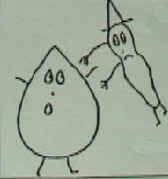 |
When the extraverted sensation type is fairly well-balanced the introverted intuition can appear in the form of ghosts, spirits and an interest in the parapsychological. One night, for example, when we were staying with friends, just before bedtime they began to tell ghost stories. They told of spirits they had seen flitting around the house, and they told these stories not as fantasies, but with the same sense of concrete detail they told all their other stories. It was impressive. When the lights went out we felt the urge to look around to see if we, too, could spot one of these spirits. |
But the undeveloped inferior function can also be oppressive. It can continually multiply fears and premonitions of disasters. Life becomes cramped. Every minute the extraverted sensation type turns around there is a new negative possibility confronting him, and so his only remedy is to confine himself to a narrow routine of the safe and tried-and-true. The energy for growth that exists in the personality has become split off from the conscious mind and hems it in on every side.
The Extraverted Intuition Type
|
Unlike the extraverted sensation types who are wrapped up in what they are doing at the moment, the extraverted intuition types are future-oriented. The possibilities for tomorrow, next week or next year are what capture their interest. Their energy flows outward, not to the external object but rather around it and through it to the possibilities it suggests. This type takes the physical details that extraverted sensation types linger over and uses them as a spring-board to fly towards what could be. They sparkle with new ideas and plans, many of which have real possibility and merit. |
They are prolific creators of new businesses, new machines, new social positions and organizations. For the young, healthy extraverted intuition type life is an ever-changing drama with new adventures around every corner. You never know what is going to happen next when you are around them.
When I went with Mike to see his land he had managed to buy in the country, his eyes danced with enthusiasm. Nobody else had even been able to find the land, but Mike had assembled the old maps and searched through the brush to find the old surveying markers. "I'm going to build a house here." He pointed to where a pile of salvaged lumber was stacked. "My well is half dug. It will be wonderful to live back here in the country away from the noise and smell of the city."
But to get an intuition isn't enough. The second function of either thinking or feeling gives the intuition type a way to evaluate his intuitions. For example, the intuition thinking type not only gets the idea for a new business but uses his thinking function to plan out the necessary steps for its establishment, while the intuition feeling type not only sees the possibility of a new social service organization but can bring her feeling function to bear to encourage people to work with her in its establishment.
I love being with this type because they are like me - with a difference. Being extraverted they don't have the same hesitations I do when it comes to dealing with exterior objects and situations. They go up to them and push on through to the other side. Their boldness gives me courage, and while they are at home in the world, they are also constantly changing that world. My intuition is happening inside myself, where no one can see, but the extraverted intuition type is making it happen out there. A new project, a new plan, a new idea not only changes, but hopefully improves the way things are. This type cannot let things alone. There is always a better, or at least another way, and he naturally seeks that new way out.
|
But the extraverted intuition types who fail to develop their second and third functions get caught up in more and more intuitions. One follows right on the heels of another, they no sooner try to work one out when another captures their attention, and the end result is that usually nothing gets completely done. Or they conceive one plan and expend enormous amounts of energy establishing it, but just as the goal gets within reach, they get bored with the details, they abandon it and leap head-long into a new adventure. |
Enough work has been done to satisfy the intuition, but they often don't have the stick-to-it-iveness to finish it. They start one new project after another, oblivious to the reason for the failure of the previous one. They are always sowing new seeds but hardly ever reaping any of the harvest.
When I saw Mike sometime later still in town, I asked, "When are you going to move out to the new place?" He looked away sheepishly and confessed that he had already sold his house in town and had cleared plenty of money, but instead of using it to work on his land in the country, somehow he had ended up buying a huge abandoned warehouse. Then, in spite of himself, he started getting excited again, telling us how he was going to build a home in the front of the warehouse and then have storage in the back for all his junk cars until he got them fixed, and have a place to build animal pens, and...
|
And then we come to the difficult fourth function. For this type it is introverted sensation. It is very difficult for him to pay careful and meticulous attention to each detail that goes into the actual execution of his intuition, and it is even more difficult for him to let these sensations slowly soak into him and let himself perceive their implications. |
For example, he will not stop and listen to the sense impressions of his own body. He becomes so involved in his plans that he forgets to eat lunch. He chases intuitions and works far into the night, forgetting to go to bed. He wears his body down in his race after new intuitions, and his body reacts in the form of accidents or sickness.
Not only his body gives him trouble. The physicalness of objects trips him up, and well. He might want to go on a trip, but he neglects to take care of his vehicle, half-way there he finds himself rolling under the car trying to fix something that he knew all along needed attention, he doesn't have the proper tools with him (he forgot to bring them), he can't do the job, and it usually costs him a lot more in service charges and lost time than if he had attended to the mechanical problem in the first place.
He needs money to keep his plans going, but working full-time, day in and day out at the same job is boring for him. And because his intuition is such a power in him he hates, probably more than any other type, to be told what to do by the boss. He always sees another way to do things.
If something goes wrong, if something breaks down, if he can't accomplish what he set out to do fast enough to satisfy his lightning-quick intuition, he is tempted to rage, kick the vehicle, throw the broken tool across the room, or simply fume and fret. These physical things with their physical problems and limitations impede his marvelous intuitive flow and he wants to punish them.
As this type matures his greatest need is to slow down, make a conscious effort to sit at the table and eat his meals with the family instead of grabbing a piece of bread on the way out the door. He has to pace himself, something he abhors, and it wouldn't hurt to make a schedule of activities and try to follow it. He has to stop and ask the question, "Is the energy and time that is being spent on this intuition worth it to me personally in terms of my own needs, health, family life and social obligations?" Questions like this are hard for the extraverted intuition type to ask because it means pausing to reflect in the midst of his headlong rush after new possibilities.
The Extraverted Feeling Type
|
The extraverted feeling type lights up a room with the sunshine of her feelings. She wants to be in accord with the world around her. Her feeling rapport with the persons or objects in her environment is her most important driving force. She oils the troubled waters of society and is at the center of its social life. She tends to have many friends of all different sorts who come to bask in her flow of feeling and sympathy, and go away glad that someone cares about them. |
She has a knack of focusing her attention on whomever is with her and you can see her visitors open up like flowers after a siege of cloudy weather. They feel like they can let their own feelings out in her presence without the fear of being criticized or ridiculed. They depend on her sympathy and are not disappointed. Since feeling rapport is so important to her she gets upset when people argue. Her goal is to smooth over difficulties and make ruffled feelings go away.
When I am with the extraverted feeling type I am amazed at the ease with which she shows either her sympathy or happiness. I naturally keep my feelings hidden because of my introversion, but hers are on display. It is nothing for her to switch from joy to sadness, depending on what people are telling her. She has no inner journey to travel before the feelings come out like I do. They are up front and accessible to all. When she focuses on me, I can't help but feel happier, or sadder, when I tell her what is going on. She magnifies what I feel.
The second and third functions of either sensation or intuition aid the extraverted feeling type in the accomplishment of this feeling rapport. For example, an extraverted feeling sensation type can make an excellent nurse, or teacher, for she develops a strong relationship to the patient or student and has the ability through the second function to tend to their immediate needs. On the other hand, the extraverted feeling intuition type can be a good social worker who has rapport with her clients and uses her intuition to discover what their real needs are.
|
When the extraverted feeling type either has not developed the auxiliary function or has developed them and reaches a state of life where a new kind of adaptation is needed, she can over-use her first function. She can exhaust herself in a whirl of visits, phone calls, shopping trips, and parties, and get so caught up in the succeeding objects of sympathy that she has no time to consider what her own personal opinions and judgments are. She can carry out extensive opinion polls among her many and varied friends as a substitute for making up her own mind. |
Her husband had just come through the door, and dinner was almost ready to be put on the table. Judy gave him a big hug - and then the phone rang. It was a girlfriend who wanted to chat. Soon Judy realized the dinner was getting cold, her husband was growing more and more impatient, and still she did not have the heart to cut the conversation short, even though this kind of call ate up her time with him. It took twenty minutes to hang up, and by then not only was the dinner in trouble, she quickly saw she would have to make an extra effort to smooth her husband's feelings.
Such a predicament is not unusual for this type. They are drawn into the lives of other people, and it is difficult for them to decide when to back off and take time for their own affairs. It takes time, and typological development, to feel free to say "no" to the requests of others.
|
A fuller adaptation to reality demands the ability to answer the question, "What do I really think?" The greatest weakness of the extraverted feeling type is introverted thinking, and it is this fourth function that holds the answer to the question of what her personal philosophy of life is. If she ignores this dimension of her personality it does not simply disappear, but it begins to afflict her in the form of negative thoughts about what other people are thinking about her. |
This begins to effect her rapport with the people around her and she makes social blunders that are inexplicable in terms of her first function. In order to solve the problem of introverted thinking the extraverted feeling type can adopt ready-made philosophies and treat them like her own personal inventions.
The Extraverted Thinking Type
|
The extraverted thinking type is logical and methodical. It is natural for him to draw on the ideas and facts in the world around him and create a plan from them, or attach himself to an already existing one. Once he has his plan he can be very efficient in carrying out the many operations needed to implement it. If his car breaks down, instead of acting impatient like an extraverted intuition type would, he systematically runs through his mental check list of possible reasons, calmly trouble shoots the problem and repairs it. |
He sticks with it until it is fixed. This type loves a challenge. Just tell him it is better to stay in bed on a stormy winter morning, and he jumps up and is off to battle the elements.
For the extraverted thinking type the help of the second or third functions of sensation or intuition gives him the ability to realize what he has thought up. If the second function is sensation, for example, he will have a practical ability to execute his plan here and now. He can be a good mechanic, engineer or executive in charge of day-to-day operations. If intuition is the second function he can be adept at finding innovative ways to carry out his conception.
When I am around this type I know that I will not have to worry about the physical problems that come up when we do a job together. He has control over the situation, he knows what is going on, and he is prepared for possible snags in the operation. The physical world does not threaten him because of his extraversion like it does me as an introvert. But his instinct is to take over. He sees the problem, he decides what to do about it, and that's that. I, as an intuition type, want to explore all the many possible ways of solving it, but he sees only one way, and he doesn't have time to listen to what he considers my flights of fancy.
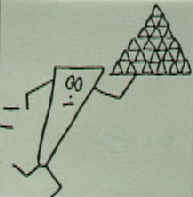 |
The extraverted thinking type without the aid of the auxiliary functions, or even with their help, reaches a point where his adaptation to reality is too one-sided. He concentrates too intensely on his plans and they act like narrow formulas that squeeze the life out of everything around him and inside him as well. He becomes dogmatic and domineering. Whatever agrees or aids his plan is good, while whatever impedes it is evil, and his way is the only way. |
When his plan becomes all consuming he will try to walk over anything or anyone who gets in his way. His motto becomes, "Let's get the job done." And he often fails to see the hurt feelings that result.
|
He can become harsh and driven, and neglect his inner self. It is in the area of introverted feeling that this neglect is most severe. He has no time to answer the question, "How do I really feel about myself?" He neglects his health, finances, or personal life in order to try to accomplish his plan, but the introverted feelings will not disappear. His feelings are delicate and he can be hurt surprisingly easily. |
When his feelings do come out, they take the form of almost childlike sentimentality. A little puppy, a flower, an especially tender story, can bring a quaver to his voice or tears to his eyes. Or they can show themselves in an outburst of ranting and raging.
INTROVERSION
The introverted types are more difficult to describe than the extraverted ones. Extraverts are out in broad daylight doing what they do in the plain sight of everyone, but the flow of energy of the introverts is inward, so their positive qualities are hidden.
We live in a society that is more extraverted than introverted. It is hard to shake the idea that introverts are really undeveloped extraverts. If only, we imagine, they would take an assertiveness training course, get over their shyness, and try to be more social, then they would be all right. Not as good as real extraverts, of course, but they could pass. This bias makes it not only hard for extraverts to understand introverts, but introverts to understand themselves. They can be literally prejudiced against their own natural attitude. Since the introvert's energy travels inwardly first to a world that is as real as the outside world, no matter how hard it is to describe, no one but himself or a few selected people around him see the main action. What the world sees is the small amount of energy that comes back out after its interior journey. No wonder it judges the introvert as a weak and deficient extravert. Let's look, then, at the different kinds of introverts and try to gain a new appreciation of just how real their inner worlds are.
The Introverted Sensation Type
|
The introverted sensation type is captivated not by the sense object, like the extraverted sensation type is, but by the subjective sense impressions that this object awakens in him. The reverberation and repercussions of the object on his inner world are what his attention focuses on. It is as if a pebble has been thrown into a pond and the ripples spread out throughout the whole inner world of subjectivity, revealing not so much the qualities of the pebble but those of the water it has been thrown in. |
The sense impressions of this type have a different quality. They are not matter-of-fact like those of the extravert, but have overtones of myth, fantasy and deeper subjective values. The introverted sensation type takes what his senses tell him, brings those details into his inner world, weighs them, experiences them in the depth of his inner self, and only after this process has been completed does the world see an outward reaction.
When I see a friend who is this type and say, "Hi", he looks like he is not reacting at all. He stands there looking blank, but a moment later he greets me. What was happening? Why the lag? He was literally taking in the details of the situation. My presence had to be absorbed and only when his inner world became saturated with those impressions could he give an outward, delayed and extraverted response to my greeting. Once that initial lag is over our conversation runs smoothly.
Because external stimuli have such an impact on him the introverted sensation type needs to keep his house, office or wherever he spends his time orderly. Neatness is important to his inner psychic comfort. He is uncomfortable in crowds, first because he is introverted, and second because he literally can become overwhelmed by external stimuli if there is too much of it. He needs to know where things are. He also takes very good care of the possessions he has. He values them, not just for what they are as an extraverted sensation type would, but for the added emotional import they have for him. The cherished Christmas tree decorations that have been in the family for years are carefully wrapped in tissue paper and gently placed in a sturdy box until next year. The piece of jewelry given by a loved one is stored in the same velvet-lined box it came in, the love letters have a clean and pressed ribbon around them, and the scribbles of their now-grown three-year-old are saved in a trunk.
|
The second and third functions of thinking and feeling help organize and evaluate sense impressions. The introverted sensation type can put a great deal of time on one physical project. Unlike the extraverted intuition type who will get bored or impatient, he keeps at it for months, and he excels where attention to detail and order is important, whether it is the repair of delicate machines, the mastering of complicated inventories or making an especially intricate quilt, sewn and embroidered with infinite care. |
If they choose to build a house the results will be perfect. Each wall, each board, will be carefully measured, skillfully painted, meticulously leveled and plumbed, but it will take him an age. Why? Because each step in the process is not simply done, but is weighed and balanced against the inner image he has inside himself. He might seem slow until you consider the wealth of images and inner sensations he is carrying around and has to sort through. This type makes dinner a quiet ceremony, serves each course with special care, a cup of coffee shared with a friend is not simply a cup of coffee, it is an event, a unique time graced by a beautiful tray and the plate of carefully arranged cookies.
Once when I went to visit a friend, he was fixing his car. If he had been an extravert he would have had a bunch of tools within easy reach, but he had them all lined up, neatly, in a row. If he had been an intuition type he would have had tools thrown here and there, and he would have been missing some, but they were all there. He had carefully collected them for the exact job he was about to do. He took out the part, carefully cleaned it, made sure all the gaskets were dirt-free, and then he just as carefully put the pieces back together again. But remember, first each piece had to travel within and then come out. When I came by I interrupted his peace, quiet and concentration which was essential for the job. He neither wanted, nor could handle, any extra stimuli. The job was his whole world at the moment. When he saw I wasn't going to go away he gave a quiet sigh and reluctantly turned his back on what he was doing, and then I was his one focus. Later he would pick up where he left off and begin again his interior-exterior dialogue with his engine. The extraverted thinker might do the same repair work, and with something of the same thoroughness, but it would be much more matter-of-fact, it wouldn't matter to him how many people were hanging around, and he wouldn't have to take interior trips as he did it.
|
The weakest function of this type is extraverted intuition, which is why he or she hates change. To move to another house, to get another job, to go to another part of the country, is traumatic. He has absorbed all the details of his present situation and is comfortable with them. To make a physical move is to throw what he has come to feel comfortable with out of the window, and he feels he has to start all over again, meaning he has to take all the thousands of new details, one by one, bring them into his inner world, find a place for them there, and then pick up the next stimulus and repeat the process. |
Seen in this light we can understand what an upset such a move is for him. A Safeway store in one town is not the same as a Safeway store in another. It is a whole new experience.
The introverted sensation type is slow to make friends. You have to approach them gradually and let them get used to you. It is peaceful for me to be around this type because topics are going to be taken up, one at a time, without a rush. When I am with the extraverted intuition type I have a hard time keeping up with all their ideas, but I find I have to tone myself down when I am with an introverted sensation type. Too many comments or stories tire them out.
The Introverted Intuition Type
|
The introverted intuition type gazes inward, not to the ripples of sensation caused by the object like the introverted sensation type, but beyond these palpable facts to try to see their root and meaning. They are visionaries par excellence, seers and dreamers. They are caught up in the explorations of the inner world and the possibilities of inner transformation. They can follow these inner paths by way of images and ideas, and they are always attempting to go deeper and find the ultimate origin and goal of the inner self. |
The introverted intuition type is not concerned with what is, but what could be, not with the outer possibilities, but the inner ones. They can have a special love of books, for books let their minds go anywhere while they are comfortably curled up in their own room. One intuition triggers another as they leap through the centuries and soon they are exhausted without ever having moved.
|
The second and third functions of thinking and feeling help the introverted intuition type in evaluating and organizing these inner journeys, but even then he has difficulty in expressing his interior world because this demands a certain degree of extraversion. His words tend to be fragmentary and evocative, as if he cannot tear his eyes from his inner world long enough to formulate what is happening in everyday language. |
|
The weakest function for this type is extraverted sensation. He might be carried away with his theories, but his socks don't match. He might be taking daily trips through space mentally, but he forgets what he went to the store for. This type finds it difficult to pay attention to the actual here-and-now physical world that the extraverted sensation type is so comfortable in. He inadvertently tends to bump into things, spill things, drop things, have his mind on something other than his food when he eats, and scarcely notices the clothes he wears or the colors of the walls of the rooms in which he lives. |
I attended a lecture where the professor bustled into the classroom late, as usual, sat down in the circle of chairs and placed his huge briefcase in front of him. His suit was rumpled and as he got up to search for his pipe, he managed to trip over the briefcase he had just put down. Tobacco began to dribble down his shirt as he waved the pipe in the air while he expounded on the subject of the day. Soon the pipe was forgotten, resting precariously on his knee, from there to slide into the already bulging briefcase. Too bad it hadn't been lit, for it was clear that a fire was the only way the briefcase would ever get cleared out. We students continued to watch, fascinated, as he punctuated his lecture by squirming around in his chair, slowly managing to dislodge his wallet from his pants pocket.
Social situations are not comfortable for him, and the bigger the group the worse it is. He thrives and comes alive when there is just one other person to talk to, but crowds make him uneasy, and he is especially miserable when it comes to small talk. He does not make a good first impression because all the action is going on inside, and he needs a special atmosphere for it to come out.
He loves quiet and solitude, not in the way society thinks of morbid introverts, but simply because it takes peace and quiet in order to go on these interior journeys. It's not enough just to have an idea, he has to push it to see if it will flower into a deeper version of the original concept, or if some new rich vein of intuition will open up to him.
Time is of the utmost importance to the introverted intuition type. He would rather eat peanut butter crackers in a low-rent apartment than go out to expensive restaurants and have a fancy house as long as the former means time for his own interests and the latter demands a full-time job doing what someone else wants him to do. Introverted intuition types flourish where bold speculation comes into its own in research and theoretical science. But since they are the most ill-adapted of all the types to the real physical world they run the danger of losing touch with ordinary life. When the introverted intuition type neglects extraverted sensation, he is not simply excused from it. He can become subject to obsessions, compulsions and scruples about food or sex which are attempts by the extraverted sensation part of the personality to gain his attention and receive their due.
The Introverted Feeling Type
|
The extraverted feeling type attaches her feelings to the people and things around her, but the introverted feeling type tries to be in rapport with her inner world, whether it be of psychic images or ethical and spiritual values, and she tries to intensify this inner accord and embrace this world more deeply and fully. For the introverted feeling type the people and things around her are occasions for her feelings, which flow inward and go deeper and try to become more intense and concentrated. |
Because of the direction of her feelings she is often accused of not having any. She has a feeling, then that feeling immediately travels to her inner world, she weighs it on her interior feeling scale, and only once the round-trip journey has been made can she express herself. So much inner activity is going on that she tends to keep her face and body still. People of ten overlook this type, or are quick to classify her as slow. If we could have an exterior picture of what is really going on, however, we would be astounded. She lacks spontaneity not only because she is an introvert, but because her feelings are a constant involvement for her.
It was a peaceful afternoon and a neighbor came over to chat with Betty and her mother. She casually mentioned that a neighborhood dog (the one Betty had spent hours with in happy contentment) had died. Betty froze. Her heart felt as though it had been pierced, but she showed no outward sign of her inner turmoil. At long length the neighbor ambled off, Betty rushed into the house, and in the solitude of her own room, she broke out into racking sobs. Her beloved friend was gone.
The introverted feeling type tries to protect herself against too strong an influence coming from the outer object and detach her feelings from it so that they can travel within. Her clinging to inner values, silent as it is, can provide a good example from an ethical and moral point of view. People around her sometimes sense this inner reality, and fidelity to inner values. But at other times they sense how they are somehow being treated with a certain reserve, held in check and subtly devalued.
|
The second and third functions of sensation and intuition can help her perceive her inner values. Her third, more extraverted function helps her come to grips with the outside world. The introverted feeling types can be literally bursting with feelings but have no ready way to communicate them both because of their direction and because their content is not readily explicable in everyday terms. |
|
Extraverted thinking is her weakest function. If she has a conversation, for example, she might spend hours, or even days, still thinking up answers she could have given but didn't. Though she might really care for someone, that person might remain in the dark because she cannot express herself well. |
She is easily tripped up by a thinking type who overpowers her with his words. When this happens she gets overwhelmed and can no longer respond. If you show displeasure or impatience with her, she is totally lost and her introverted feelings block up her weak thinking power, and she can easily be made to feel inadequate in our more verbal, active society. When upset, she will give you dark looks but it might be days before you know what is bothering her. Her fourth function thoughts are like birds - they come and go, and often fly off before they can be caught.
The Introverted Thinking Type
|
While the extraverted thinking type starts with facts and ideas he finds in the world around him and ends up with plans to be accomplished, the introverted thinking type makes facts serve his thoughts. He uses them to help build his inner world of ideas. He takes delight in pursuing the orderly development of his own ideas until he has created a logical kingdom within. |
His outer conduct often reflects this inner sense of order. He can be organized, make a plan for the day, and actually follow through on it.
Once when we spent the day with a friend of this type it was a fascinating and enjoyable experience of precision planning. It started with a well-balanced breakfast for the whole family that he cooked and served with a minimum of fuss. Then off we went for a guided tour of all the local attractions carefully selected in advance to appeal to all the different members of the family.
The auxiliary functions of sensing or intuition help him develop this interior world of thought. If intuition dominates he may devote his energy to philosophy or law or theoretical science. If sensation is the companion to thinking, he can be attracted to accounting or business.
|
If he concentrates excessively on his own world of thought he will begin to neglect the rest of life that can't be expressed in thoughts. He will be tempted to say, "If I can't think it, it isn't real." Then the thoughts begin to imprison him and can even lose their objective character, for they become substitutes for developing the rest of his personality. |
|
The greatest weakness of the introverted thinking type is in the area of extraverted feeling. He has difficulty in expressing his feelings, and when his feelings do come out, other people are not always comfortable with them. He gives the appearance of lacking compassion, and is inclined to say things that others take as sarcastic or insulting. But he doesn't see them that way. He feels he is just trying to be logical. He gains a reputation for being self-contained, competent and even cold. But he has feelings, and plenty of them. It's just that they are deep down, hard for him to express, and delicate and easily hurt when they come out. |
What Is Your Psychological Type?
As I mentioned, it took me a long time to finally figure out what type I was. You will probably be quicker, but don't become impatient with yourself. The more your appreciation of your own type takes into account the memories, dreams, fantasies, and experiences that go to make up you, the more useful your final decision will be.
No quiz, no matter how artfully constructed, can replace this slow process of type recognition. It is hard to convey what this kind of tracking is like. It would be much easier if we could go tracking together and evaluate real life situations. Then we could see the tell-tale hesitation that marks an introvert when he meets someone for the first time, or the enthusiasm that fills an extraverted intuition type when he is in the grip of a new idea. Or we could walk down one of those difficult type trails where we accumulate clues, each one of which is like a knotted thread on the back of a tapestry. And then after months, or even years, after endless revisions and reevaluations, we would see these perceptions finally come together. The tapestry is suddenly flipped over, and in a moment we understand that person's type.
